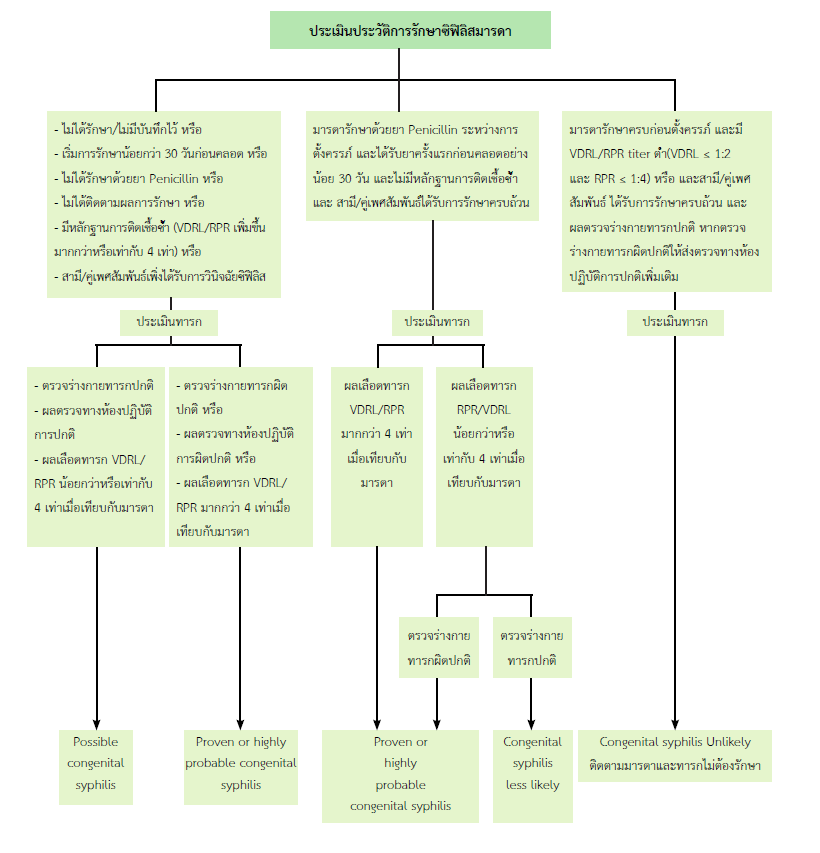Management for Pregnant Women with Syphilis at Siriraj Hospital
Main Article Content
Abstract
As a global concern, the number of patients with syphilis is increasing in many parts of the world, including Thailand. The incidence is remarkable in young people who are likely to be in the early stage of syphilis. According to the fact that teenage pregnancy is another national health problem, the increasing trend of congenital syphilis (CS) has been observed. The barriers to eliminate CS include delayed diagnosis, no/delayed treatment, lack of awareness regarding re-infection , no/inadequate partner treatment, loss to follow-up after treatment and little collaboration between obstetricians and pediatricians. As a result, the Unit of Infectious Diseases, Department of Obstetrics and Gynecology has developed the clinical pathway for caring pregnant women infected with syphilis with great support and contribution from the Department of Nursing, the Department of Pediatrics and the Department of Internal Medicine. This brings about the higher standard of care. Pregnant women with syphilis from other hospitals are also welcome. Apart from the service of penicillin desensitization and antenatal care, the Unit has prepared education materials, consultation and clinical visits. Many on-going projects and further collaboration as well as introduction to our innovations have been working on.
Article Details

This work is licensed under a Creative Commons Attribution-NonCommercial-NoDerivatives 4.0 International License.
References
World Health Organization. American Academy of Pediatrics. Redbook 2021: Report of the Committee on Infectious Diseases. 32 ed. Itasca, IL: American Academy of Pediatrics; 2021.
Ministry of Public Health, The Royal Thai Government. Maintenance for Thailand: The Validation of the Elimination of Mother-to-Child Transmission of HIV and Syphilis, 2018-2019. Available from: https://www.hp.anamai.moph.go.th/th/mch-emag/download/?did=203667&id=69447&reload=.(Accessed 15 January 2023).
World Health Organization. Global guidance on criteria and processes for validation: elimination of mother-to-child transmission of HIV, syphilis, and hepatitis B virus. Available from: https://www.who. int/publications/i/item/9789240039360. (Accessed 15 January 2023).
World Health Organization (Initiative for the global elimination of congenital syphilis). Investment case for eliminating mother-to-child transmission of syphilis, Promoting better maternal and child health and stronger health systems. Available from: https://www.who.int/reproductivehealth/publications/rtis/9789241504348/en/.(Accessed 20 January 2023).
Rungmaitree S, Mokkhamakkun C, Phongsamart W, Lolekha R, Wittawatmongkol O, Lapphra K, et al. Incidence of and factors associated with congenital syphilis at a tertiary hospital in bangkok, Thailand. Southeast Asian Journal of Tropical Medicine and Public Health 2019;50(6):1-12.
Workowski K, Bachmann L, Chan P, Johnston C, Muzny C, Park I, et al. Sexually transmitted diseases treatment guidelines, 2021. MMWR Recomm Rep. 2021;70(4):1-184.
สำนักโรคเอดส์ วัณโรคและโรคติดต่อทางเพศสัมพันธ์ กรมควบคุมโรค กระทรวงสาธารณสุข. แนวทางการกำจัดโรคซิฟิลิสแต่กำเนิด พ.ศ. 2563. กรุงเทพมหานคร: อักษรกราฟฟิคแอนด์ดีไซน์; 2564.
Gonzalez-Estrada A, Radojicic C. Penicillin allergy: a practical guide for clinicians. Cleve Clin J Med 2015;82:295-300.
Wongsa C, Sompornrattanaphan M, Chayachinda C, Swasdimongkol P, Thongngarm T. Penicillin-allergic pregnant women with syphilis: Flow of management at Siriraj Hospital. Siriraj Med Bull 2021;14(4):62-73.
CDC guidline Syphilis during pregnancy – STI treatment guidelines. Available from: https://www.cdc.gov/std/treatemnt-guidelines/syphilis-pregnancy.htm. (Accessed 10 Apirl 2023).
Nathan L, Bawdon R, Sidawi J, Stettler R, McIntire D, Wendel GJ. Penicillin levels following the administration of benzathine penicillin G in pregnancy. Obstet Gynecol 1993;82:338-42.
Weeks J, Myers S, Lasher L, Goldsmith J, Watkins C, Gall S. Persistence of penicillin G benzathine in pregnant group B streptococcus carriers. Obstet Gynecol 1997;90:240-3.
Zhu L, Qin M, Du L, Xie R, Wong T, Wen S. Maternal and congenital syphilis in Shanghai, China, 2002 to 2006. International Journal of Infectious Diseases 2010;14S:e45-e8.
Thamkhantho M, Chayachinda C, Yindeear-rom P. Prevalence of incomplete post-treatment follow-up visits in female patients with syphilis and the associating factors. J Med Assoc Thai 2020;103(2):163-7.
ณัฏยา อ่อนผิว, พรรณยุพา เนาว์ศรีสอน, พยอม สินธุศิริ. สตรีตั้งครรภ์ติดเชื้อซิฟิลิส: บทบาทพยาบาล. วารสารพยาบาลทหารบก 2020; 21(3): 1-10.






